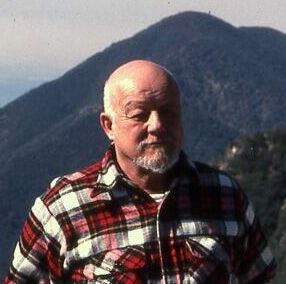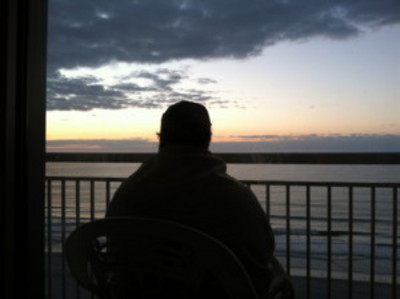
Attend the TAT Foundation's April Conference!
March 2013
This Month's Contents: In Defense of the Small by Shawn Nevins | Renascence by Edna St. Vincent Millay | Video: Amongst White Clouds by Edward A. Burger | Video: Choros by Michael Langan & Terah Maher | Quotes | The Author |
Editor's Note
by David Weimer
Welcome back!
In Defense of the Small
by Shawn Nevins
2/13/13
 This is an essay about living, which may be surprising for a couple of reasons. For one, I usually directly or indirectly write about death, rather than life. Some might charge I am life-denying rather than life-affirming; that I've hardly lived; that I turned my back upon the world. The other reason, is that "small" and "living" are two words that generally contradict rather than complement one another in the popular imagination. Despite these uncertain qualifications, I propose to answer, "What does it mean to really live?"
This is an essay about living, which may be surprising for a couple of reasons. For one, I usually directly or indirectly write about death, rather than life. Some might charge I am life-denying rather than life-affirming; that I've hardly lived; that I turned my back upon the world. The other reason, is that "small" and "living" are two words that generally contradict rather than complement one another in the popular imagination. Despite these uncertain qualifications, I propose to answer, "What does it mean to really live?"
For several years, my home was a tin-plated shack in the backwoods of West Virginia. Our running water was a jug by the sink, and our other amenities included an indiscriminate collection of mattresses of dubious age, two bare bulb ceiling lights, a cast-iron water heater reincarnated as a woodstove, and an outhouse. I now live within twenty minutes of downtown San Francisco, have every conceivable delicacy at my fingertips, and a view of the bay from my living room. Which scenario is real living? I have lived alone, with roommates, and now with a partner. Which one is real living? I have lived in fear and in contentment, with ignorance and certainty, with a shred of wisdom and with a sackful of illusions.
Most of what people call living makes the world more bland – we become inured to experience and constantly seek novelty: bigger, louder, faster. We collect experiences like bird watchers filling out their life lists, and our literature chronicles our desire: 1000 Places to See Before You Die, The Ultimate Bucket List, What Do You Want to Do Before You Die? Doing, Collecting, Having. Yet, we are also pulled by nostalgic yearnings for a simpler time where the golden rays of dawn tint the scene, memory teeters in perfect balance between one moment and the next, and a deep sigh of satisfaction fills our being. We rest on the old front porch, by the creek in the forest, in the valley meadow, or in the desert canyon. Just as our bucket is never full, though, our nostalgic memory never seems to match where we presently stand. Or does it? "Where do you presently stand?" is the key question, because that is where you are living.
Some say that enlightenment has nothing to do with living. There is a lot of truth in that. If we really knew how to live, we might not seek enlightenment at all, for enlightenment automatically brings a perspective that is not of this world. That is why we haul out the word "transcendent." But is transcending life really living life? Much of what drives us to seek an awakening is a desire to escape the world, or be somewhere, something, someone other than we are right now. So we lock our selves in meditation halls, assume detached stances in which we try to distance our self from our experience, and alternately deny and indulge every sort of sense—all to break free from the bondage of life.
You can collect experiences, or nostalgically yearn for something that never was, or pretend to transcend the whole messy fray... and likely stumble from one posture to the next like a drunken yogi. Or, as you already know, you can just "be."
We say "be here now" and "live in the moment," but doing it is another matter. Because, as you've heard, doing is in the way of being.
Others say we must die in order to live.
I say that in the process of dying we learn how to live. You knew I was going to work death into this somehow....
I maintain there is as much beauty and wonder in a slice of a moment as there is in an hour at an amusement park. Besides, what is the hour made of, if not slices of moments? Noticing that, I support the exhortation of Douglas Harding to "simplify!"
So I speak in defense of the small: for the view out my window which changes every hour of every day of the year and is never the same. For the feel of a tree, the sound of a car door closing. For the innumerable, ineffable, myriad of sounds, smells, and sights that surround me every minute of every day offering a lifetime of beauty in the palm of my hand. I speak for the one-to-one conversation in a quiet coffee house or on the couch before a darkened television. This is the beginning of living.
I speak in defense of god in the ordinary.
And I say that dying is wrapped in the fabric of living. I say that life is the moments between death and death is in the moments between life. In recognizing our life and death, we come to a fuller living. This is not just an intellectual exercise, though, you must see and feel it.
You will never know where you stand unless you look. I say look, and follow that fascination, let the muse take your hand and guide you. This exploration of awareness expands rather than contracts our perception of novelty. A plastic bag circling in the wind becomes a vision of God. Every moment becomes an amazing experience that we receive rather than seize. It doesn't mean we don't watch the fireworks, but the immensity of sky in which they take place is so much grander. Likewise, the immensity in which our thoughts take place, in which our lives take place, is like the feeling of the surface of our skin – we don't notice unless we pay attention and we don't pay attention unless we allow ourselves the space in which to notice.
The myriad things are the myriad things, but the one thing is the one.
Simplify. Pay attention to the ordinary and obvious. Notice the space in which all occurs. See the arising and falling of all things. You'll live a kinder, gentler life; become a better neighbor, father, mother, lover, brother, and friend; reduce your footprint on the planet, save money, become more creative, be happier and reduce stress. In short, you'll really live, and in so doing you may see a profound truth about your relationship to death.
Wherever I look, there by the grace of god am I.
Read more of Shawn's thoughts and explore his poetry in the TAT Forum Archives.
|
Renascence
All I could see from where I stood
I screamed, and -- lo! -- Infinity
Long had I lain thus, craving death,
Deep in the earth I rested now;
The rain, I said, is kind to come
I ceased; and, through the breathless hush
I know not how such things can be
The world stands out on either side
|
Amongst White Clouds
by Edward A. Burger
If you don't see the video above, visit YouTube.
Choros from Michael Langan on Vimeo.

|
Quotes...."Was 40 years ago I sat in Richard's gatherings at CWRU. I believe a young man named August was assisting him and I have never gripped the edge of my chair, as then, since. And never had I dreamed that the pursuit of accuracy would be such a lifelong challenge. Perhaps basic 'common sense' of which we all speak is far more elusive than it's given credit for. Not very common at all, actually, yet it's the only worthy endeavor. Thank you for remembering him still."
~Jeffrey Reinker
|
The author....
The author has something to say which he perceives to be true and useful, or helpfully beautiful. So far as he knows, no one has yet said it; so far as he knows, no one else can say it. He is bound to say it, clearly and melodiously if he may; clearly at all events. In the sum of his life he finds this to be the thing, or group of things, manifest to him;—this, the piece of true knowledge, or sight, which his share of sunshine and earth has permitted him to seize. He would fain set it down for ever; engrave it on rock, if he could; saying, "This is the best of me; for the rest, I ate, and drank, and slept, loved, and hated, like another; my life was as the vapour, and is not; but this I saw and knew: this, if anything of mine, is worth your memory."
~John Rushkin, from Sesame and Lilies (two lectures delivered at Manchester in 1864)
Did you enjoy the Forum? Then buy the book!
Beyond Mind, Beyond Death
is available at Amazon.com.



